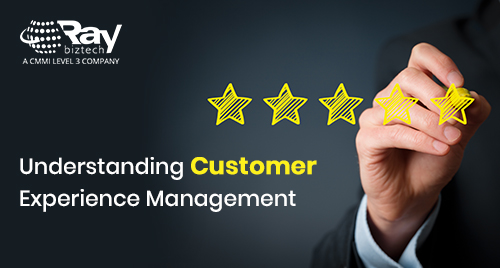Understanding Customer Experience Management

Earlier the communication or the content flow was just in one direction i.e. from marketer/company to the customers. Customer opinions or feedbacks were reviewed occasionally through online surveys, which didn't prove to be much effective. However, today marketing is more focused on Customers - what they want. How they want? Customers demand for seamless omnichannel experiences or they may shift to competitors. To create an effective customer experience, let us understand what Customer Experience (CX) is?
Defining Customer Experience (CX) and Customer Experience Management (CEM)
Customer experience (CX) is determined by interactions between a marketer and a potential customer throughout the customer life cycle. This interaction can be either conscious or unconscious in the form of product awareness, social contact, purchases, and after sales service. Customer experience is an essential part of Customer Relationship Management (CRM) and is of utmost importance as a happy customer is more likely to become a repeat and loyal customer.
Whereas, Customer Experience Management (CEM) is a strategy used to track, manage and organize all customer interactions, in order to help a business focus on the needs of its customers. It actually focuses on designing and responding to customer interactions to meet or surpass customer expectations and, consequently, increase customer satisfaction, loyalty and support.
CEM helps in bridging the gap between the marketer and the customer by designing an effective customer experience strategy. The objective of CEM is to build loyal customers and to reduce customer mix. CEM sounds to be a emotional concept but is necessary to follow, because if you don't listen to your customer requirements you may lose them soon.
Benefits of Customer Experience Management (CEM)
- Reinforces brand preference through distinguished experiences.
- Through increased sales, there is an increase in revenue from existing customers and new potential customers by word of mouth approach.
- Improves customer loyalty, and creates brand advocates, through esteemed and unforgettable customer interactions.
- Cost reduction due to less customer churn.
There are a number of ways to perform CEM, but most companies use the basic CEM model. Firstly, companies gather responses from their customers to understand their experience. These responses can be collected through online surveys and customer satisfaction polls and outreach. Once the companies have collected all the responses from customers, they share these insights across the entire organization. Finally, companies need to ensure that they deliver the most favorable customer experience based on the responses they collected. Companies must constantly evaluate their customer experience in order to improve.
Whether you use software to connect to your potential customer or design a tool that manages both customer and content, remember to keep an emotional touch throughout the process. Meaningful connections need to be built with customers to retain them and keep them loyal.
About Raybiztech
Raybiztech is a leading global Information Technology (IT) Services and Solutions, a CMMI Level 3, ISO 27001:2022 Certified Company. We are a Member of NASSCOM, HYSEA, NJTC, and AIIA. Raybiztech offers comprehensive end-to-end IT Services for Business Application Development, Enterprise Solutions, Enterprise Collaboration Services, Testing and Quality Assurance Services, Cloud Computing and IT Infrastructure Management to organizations in the Banking & Finance, Insurance, Healthcare, Manufacturing, Retail, Media & Entertainment, Leisure & Travel, Telecom and Energy & Utilities verticals as well as Independent Software Vendors.

